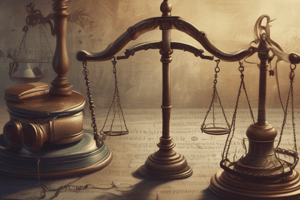Podcast
Questions and Answers
What is the primary goal of the justice process in restorative justice?
What is the primary goal of the justice process in restorative justice?
- To facilitate exchange of information and mutual consent between victim and offender (correct)
- To reduce recidivism rates
- To punish the offender
- To ensure victim satisfaction
Who has the principal role in defining and directing the terms and conditions of the exchange in restorative justice?
Who has the principal role in defining and directing the terms and conditions of the exchange in restorative justice?
- The judge
- The offender
- The victim (correct)
- The community
What is the approach to offenders in the justice process according to restorative justice principles?
What is the approach to offenders in the justice process according to restorative justice principles?
- Healing and integration into the community (correct)
- Rehabilitation and treatment
- Punishment and isolation
- Surveillance and monitoring
What is the primary focus of the justice process in restorative justice?
What is the primary focus of the justice process in restorative justice?
How does the justice process contribute to the community according to restorative justice principles?
How does the justice process contribute to the community according to restorative justice principles?
What is the approach to unintended consequences of justice responses in restorative justice?
What is the approach to unintended consequences of justice responses in restorative justice?
What is the primary consideration in restorative justice when it comes to outcomes?
What is the primary consideration in restorative justice when it comes to outcomes?
When are outcomes that are predominantly deterrent or incapacitative implemented in restorative justice?
When are outcomes that are predominantly deterrent or incapacitative implemented in restorative justice?
What is the primary focus of restorative justice in terms of offender accountability?
What is the primary focus of restorative justice in terms of offender accountability?
Who are the primary parties involved in the restorative justice process?
Who are the primary parties involved in the restorative justice process?
What is the main principle of engagement in restorative justice?
What is the main principle of engagement in restorative justice?
What are the three pillars of restorative justice?
What are the three pillars of restorative justice?
What is the primary difference between restorative justice and the traditional legal system?
What is the primary difference between restorative justice and the traditional legal system?
What is the role of the judge in the traditional legal system?
What is the role of the judge in the traditional legal system?
What is the primary goal of restorative justice?
What is the primary goal of restorative justice?
What is the key element of restorative justice that is missing from the traditional legal system?
What is the key element of restorative justice that is missing from the traditional legal system?
What is a key principle regarding the participation of victims and offenders in restorative processes?
What is a key principle regarding the participation of victims and offenders in restorative processes?
What happens if an offender fails to implement an agreement made in a restorative justice process?
What happens if an offender fails to implement an agreement made in a restorative justice process?
Can agreements made in restorative justice processes be used as evidence of guilt in subsequent legal proceedings?
Can agreements made in restorative justice processes be used as evidence of guilt in subsequent legal proceedings?
What is the purpose of judicial supervision in restorative justice programmes?
What is the purpose of judicial supervision in restorative justice programmes?
What is a key principle regarding the confidentiality of restorative justice proceedings?
What is a key principle regarding the confidentiality of restorative justice proceedings?
What happens if a party fails to reach an agreement in a restorative justice process?
What happens if a party fails to reach an agreement in a restorative justice process?
What is a principle regarding agreements made in restorative justice processes?
What is a principle regarding agreements made in restorative justice processes?
What is the purpose of requiring children's consent in restorative justice processes?
What is the purpose of requiring children's consent in restorative justice processes?
What is the primary reason behind the resurgence of interest in alternative responses to crime and social disorder?
What is the primary reason behind the resurgence of interest in alternative responses to crime and social disorder?
What is a key characteristic of restorative justice programmes?
What is a key characteristic of restorative justice programmes?
What is the purpose of an ethical commission in restorative justice?
What is the purpose of an ethical commission in restorative justice?
What is a challenge faced by participatory justice?
What is a challenge faced by participatory justice?
What is a goal of restorative justice programmes?
What is a goal of restorative justice programmes?
What is required for the successful implementation of restorative justice programmes?
What is required for the successful implementation of restorative justice programmes?
What is a crucial step in the effective implementation and sustainability of restorative justice initiatives?
What is a crucial step in the effective implementation and sustainability of restorative justice initiatives?
What is a context in which restorative justice programmes are applied?
What is a context in which restorative justice programmes are applied?
What should be considered when designing a restorative justice programme?
What should be considered when designing a restorative justice programme?
What is a potential outcome of restorative justice programmes in developing countries?
What is a potential outcome of restorative justice programmes in developing countries?
What is a key principle of restorative justice programmes?
What is a key principle of restorative justice programmes?
What is an important aspect of the implementation process of restorative justice initiatives?
What is an important aspect of the implementation process of restorative justice initiatives?
What is a characteristic of the participation of individuals in restorative justice programmes?
What is a characteristic of the participation of individuals in restorative justice programmes?
Why may adopting policies and clear guidelines be sufficient in some cases?
Why may adopting policies and clear guidelines be sufficient in some cases?
Who should be involved in the implementation of restorative justice programmes?
Who should be involved in the implementation of restorative justice programmes?
What may be adapted to incorporate elements of restorative justice?
What may be adapted to incorporate elements of restorative justice?
Flashcards are hidden until you start studying
Study Notes
Restorative Justice
- Emphasizes offender accountability and responsibility, but defines accountability as making amends rather than just punishment
- Promotes engagement and participation of victims, offenders, and community members in the justice process
Key Elements of Restorative Justice
- Harms and related needs (of victims, communities, and offenders)
- Obligations resulting from harm (of offenders and communities)
- Engagement of stakeholders (victims, offenders, and community members)
Importance of "Who" and "How"
- Who is involved in the justice process and how they are involved is crucial
- Restorative justice maximizes opportunities for exchange of information, participation, dialogue, and mutual consent between victims and offenders
Principles of Restorative Justice
- Face-to-face encounters are appropriate for some instances, while alternative forms of exchange are more appropriate in others
- Victims have the principal role in defining and directing the terms and conditions of the exchange
- Mutual agreement takes precedence over imposed outcomes
- Opportunities are provided for remorse, forgiveness, and reconciliation
Focus on Offenders
- Offenders' needs and competencies are addressed
- Healing and integration of offenders into the community are emphasized
- Offenders are supported and treated respectfully in the justice process
- Removal from the community and severe restriction of offenders is limited to the minimum necessary
Community Involvement
- Community members are actively involved in doing justice
- The justice process draws from community resources and contributes to the building and strengthening of community
- The justice process attempts to promote changes in the community to prevent similar harms and foster early intervention
Monitoring and Evaluation
- Justice monitors and encourages follow-through to maximize healing, recovery, accountability, and change
- Fairness is assured through provision of necessary support and opportunities to all parties, avoiding discrimination
- Unintended consequences such as co-optation of restorative processes for coercive or punitive ends are resisted
Definition of Restorative Justice
- Restorative justice provides an alternative response to crime and social disorder, involving parties directly affected by the conflict
- It promotes participation, local decision-making, peaceful expression of conflict, tolerance, and inclusiveness
- It builds respect for diversity and promotes responsible community practices
Challenges and Limitations
- Mobilizing civil society involvement while protecting the rights and interests of victims and offenders is a challenge
- The right not to participate must be respected, and neither victims nor offenders should be coerced or induced to participate
- Participation is not evidence of guilt, and agreements should be voluntary and reasonable
Implementation of Restorative Justice Programmes
- Successful implementation requires strategic and innovative initiatives, collaboration, and careful planning and monitoring
- Crucial steps include legislation, leadership and organization, securing a buy-in by the criminal justice system, and identifying and mobilizing community assets
Studying That Suits You
Use AI to generate personalized quizzes and flashcards to suit your learning preferences.




